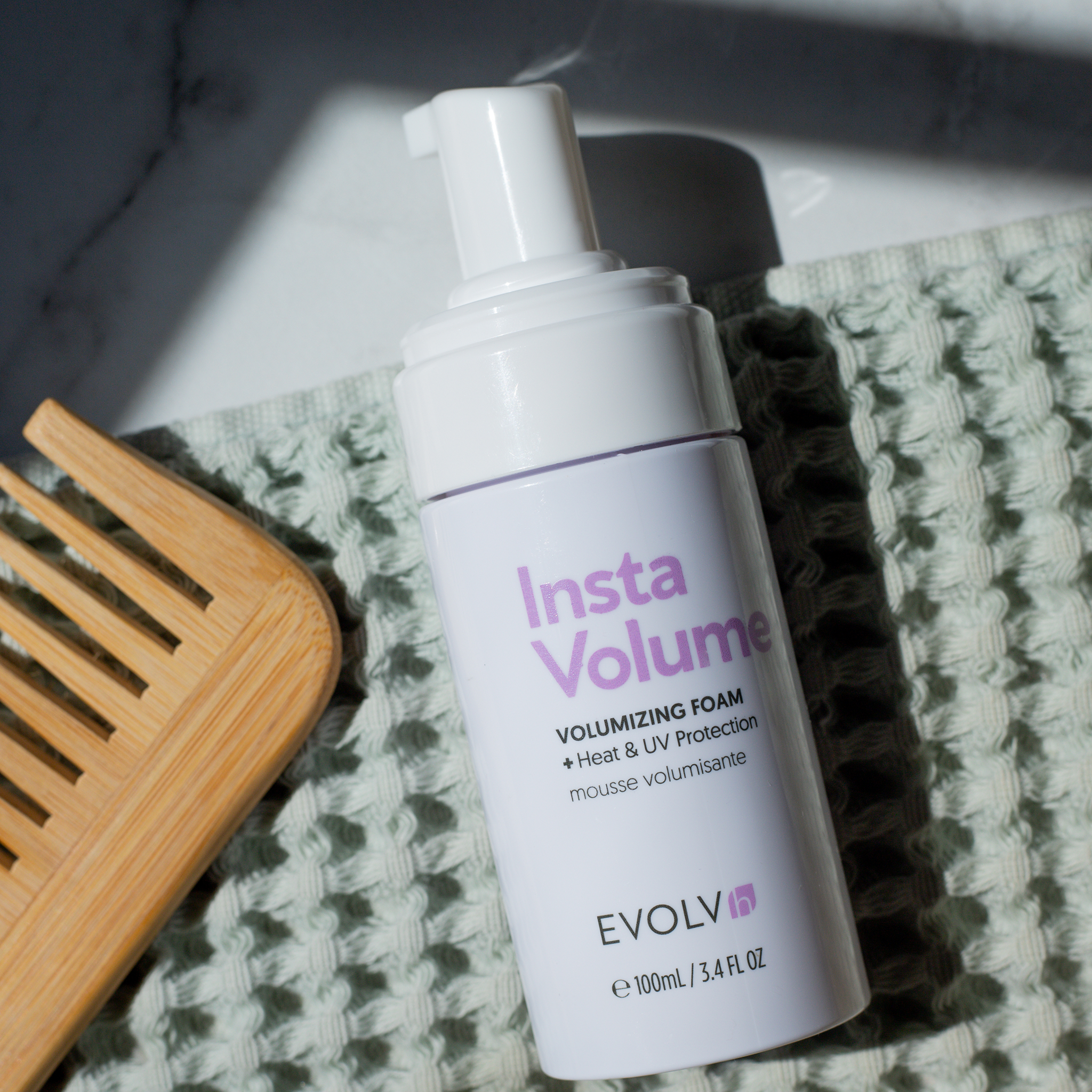How Often You Should Wash Your Hair, Really

“Someone: your hair looks nice today
Me: thanks, I washed it”
By now we’ve all seen this meme, maybe a few too many times (ok yeah, we’ll admit we still laugh every time). It’s funny because it reminds us that we are lazy and don’t always wash our hair as often as we perhaps “should” - but, to get hair nerdy about this, it just isn’t true. The scientific truth is - you’re more likely to be washing your hair too frequently, which leaves your strands brittle and prone to breakage and breakage doesn’t look good on anybody. So where’s the balance?
WHAT’S CAUSING YOUR HAIR TO GET “DIRTY”
In between washes your hair gets greasy due to glands in the skin that produce an oily substance called sebum (also responsible for making our faces oily). Sebum is produced by the body to keep your hair and skin from drying out. It does more harm than good to get rid of this oil too often as it will simply dry your scalp out causing more sebum than usual to be produced and therefore making your scalp oilier than it was in the first place.
OK, SO HOW OFTEN IS RIGHT FOR ME?
Although it’s impossible to say how often you should be washing (since everyone produces a different amount of sebum due to genetics and hormones), dermatologists do state that no one should need to wash their hair every day. There are three main factors to consider when trying to pin down how much washing is right for you:
1. Skin Type. If you don’t notice that your skin or scalp are extra oily or extra dry then you most likely only need to wash your hair about twice a week. If it errs on the oily side - wash more often. On the dry side - wash less.
2. Hair Texture. Texture affects the time it takes for the sebum produced to work its way to the ends of your hair. Coarse and curly hair slows sebum down meaning you need to wash less often, whereas fine hair calls for more frequent washes since your sebum can travel more freely.
3. Styling. The final element to consider is how much you put your strands through when it comes to styling and treatments. If your hair is damaged from these processes you should consider washing less frequently.
HOW MANY WASHES THOUGH?!
Beyond the frequency per week, there’s also the debate of whether to wash once or twice per wash. The same logic applies, if your hair is curly, dry, or damaged, try washing only once as your hair type needs to retain all the moisture it can get.
With that said, many people can benefit from the two wash method keeping in mind skin type, hair texture, and styling as previously mentioned. The first go round is simply to remove surface dirt, and the second can be your therapeutic, luxury lathering (with a second pass you will experience max sudsing) where you can focus on your scalp.
Either way, you should always include a scalp massage to prevent hair loss and promote hair growth. Research shows that scalp massage can also reduce muscle tension, lower blood pressure, reduce levels of stress hormones, and slow heart rate.
CLEAN INGREDIENT SHAMPOOS
Just a bit about lather and shampoo types here. With clean formulation shampoos (like ours), the two wash method is often most effective due to the nature of the ingredients used. Organic and natural shampoos and soaps use naturally occurring ingredients to get the perfect amount of lather rather than chemicals and inexpensive detergents typically used in traditional products that are specifically added to make products lather artificially.
For your hair and health though, you should always choose clean ingredient products. More lather does not mean better cleaning, and toxin-fee is the best way to go. On days you’re craving that lather experience, use the two wash method with your clean products.
MYTH BUSTER: SWITCHING SHAMPOO
You may have heard the common misconception that you need to continually switch out your shampoos to keep them effective. While this may be true for some brands (as we explain below), this is a myth for EVOLVh products.
Most shampoos and conditioners contain extra (potentially harmful) ingredients meant to coat your hair to give it the effect of smoothness and shine. These ingredients cause buildup rendering them less effective with more use as the buildup stops any more of the beneficial ingredients from getting through.
Clarifying shampoos were developed along the way to remove buildup, but we do not recommend these as they strip hair of its natural hydration which can be difficult to regain.
EVOLVh is unique in that it works from within, much like skincare. It does not coat, but rather utilizes short chain amino and fatty acids that are small enough to penetrate every single strand to ensure that beneficial ingredients reach the target location - resulting in maximum strength, shine, and smoothness. By treating hair internally rather than topically, EVOLVh creates no buildup and you will therefore have no need to switch up your shampoo periodically.
WHAT ABOUT CONDITIONER?
Now that you have a clearer picture of how often you should be shampooing, let’s move on to best practices for your conditioning routine.
Chances are, if you’re a curly or wavy girl you’ve heard of co-washing, which is simply short for conditioner-only washing. Co-washing can be beneficial for all hair types, but is especially great for the curly/wavy girls since they shouldn’t be washing as often as those with fine hair. Curls crave moisture and are more prone to dryness due to the natural arcs and angles that expose the openings in their cuticle layer and because scalp oils can’t travel down their hair shaft as easily.
A conditioner only wash helps for the in between days when you aren’t quite ready to shampoo, but need to refresh your strands. Since conditioner does not cleanse, it won’t remove any of the needed sebum, but will restore a bit of your shine and softness. There are no real downsides to co-washing, so feel free to do it as frequently as needed, but definitely don’t ditch shampooing all together.
If you suffer from damage (color, highlights, heat tool use, etc.) or especially dry hair, another great way to supplement your conditioning is to mix together ½ parts conditioner with ½ parts of a treatment or mask such as our UltraRepair Reconstructing Masque for restoration.
NOT ALL TOWELS ARE CREATED EQUAL
Simply put, towels are meant to absorb moisture, not rub it out. Vigorously rubbing your wet hair with the thick and often harsh fibers of a towel can lead to major hair problems including excessive breakage and hair fall.
While air drying is always best (just not in the cold), treat your hair with care by wrapping it in a hair towel/wrap, or even an old cotton t-shirt, post washing.
If you must use a towel, gently pat or blot and avoid excessive rubbing. For hair requiring maximum moisture (like curls) we suggest nixing the traditional towel from your routine altogether, your hair requires special care when drying so opt for a gentle hair towel instead.
BUT WAIT...THERE’S ONE MORE STEP
We aren’t done. If you thought we were, you may not know just how important a leave-in conditioner is and we’re here to tell you...that it is...SO important!
Leave-in conditioners help protect your hair by locking in the benefits it received from shampooing and conditioning, as well as balancing your hair’s pH (to close the cuticle and produce maximum shine), fighting frizz, detangling, protecting against heat and UV damage, and helping to refresh on those days between washes.
Your hair is most fragile when it’s wet, so it’s important to apply leave-in conditioner immediately following your shower. You can also use leave-in conditioner as a daily refresh, in which case it would be applied to your dry hair before styling. Don’t forget: it doubles as a heat protectant so don’t even think about using a hot tool without spraying with a leave-in first.
NOW FOR A LITTLE SOMETHING EXTRA
As the final addition to your shower routine, you should include a weekly treatment or masque (AKA reconstructors) for your strands. A reconstructor contains protein and works to restore structural integrity to the hair. Don’t confuse them with deep conditioners which add moisture, but do not actually repair. A high-performance reconstructor will multi-task by not only repairing damage from all of the rigors of chemical services and heat styling, but will also impart additional moisture, rebuild areas of your hair where protein is lacking, prevent future breakage, and restore elasticity. They’re an absolute miracle worker for your hair!
Our UltraRepair Reconstructing Masque is our clean ingredient high-performance answer to a reconstructor with the unique quality of being able to be left in your hair overnight for maximum results, whereas most reconstructors cannot be left in overnight (please be careful and read product instructions thoroughly). This intensive treatment is reparative for hair that has been compromised by color or bleach processing, heat styling, or environmental factors - especially wind and winter weather or sun and salt/pool water. The result is “straw to silk!” and creates bouncy, shiny, silky, and strong hair, no matter its previous condition!
Learn more about reconstructors >
YOU’RE ALL SET
The good news is that you no longer have to feel guilty about not washing your hair and you are now equipped with the best tips to know how often you should actually be washing. The “bad” news is that it takes a little bit of trial and error to figure out the exact timing between washes for your particular hair because each person’s scalp and body is unique. But we are here to walk alongside you and give you the best, clean, high-performance products to help you on that journey!
Be sure to explore all of our shampoo and conditioner duos, our leave-in conditioners, and our UltraRepair Reconstructing Masque to help ensure that your hair is its absolute happiest and healthiest.
Take our HAIR QUIZ to get custom product recommendations and please don't hesitate to reach out if you need any further help with figuring out your routine - simply send any and all questions to hello@evolvh.com!



